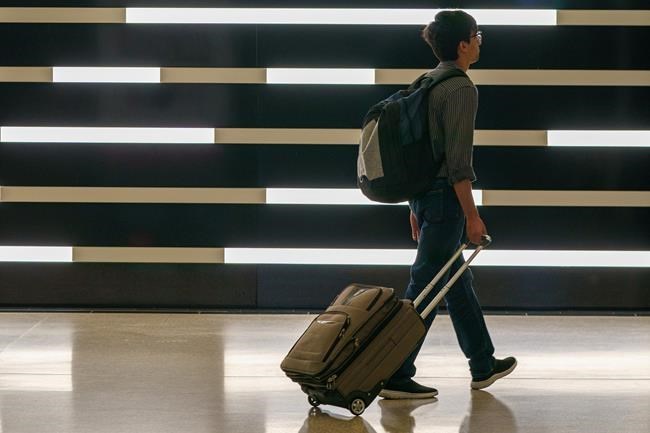Some Canadian workers are raising concerns about a full return to office and work travel as Ottawa lifts all remaining border restrictions and experts warn of a potentially large wave of new COVID-19 cases this fall.
The federal government says COVID-19 border restrictions will be removed as of Saturday, including mandatory vaccination, testing and quarantine of international travellers, as well as the requirement for masks on planes and trains.
For many it's a welcome and overdue decision. But others are leery of this new phase of the pandemic.
The "living with COVID" stage has seen most mask mandates dropped, self-isolation rules nixed and mandatory workplace vaccine polices rescinded.
Yet as the risk of repeat infection and long COVID is better understood, some workers worry about exposure from a daily commute, travelling for conferences or working in a shared space.
Some are even leaving their positions that require office attendance or significant travel.
Ben MacLeod quit his dream job over health concerns.
Earlier this year he moved back to his hometown of Halifax from Asia in search of career experience and safe harbour during the pandemic.
Nova Scotia's response to the novel coronavirus was among the most cautious in the world and he thought it was a safe bet.
Instead, he said he was told to work in person as the Omicron variant swept the province. Most of his colleagues eschewed masks, even as COVID-19 cases spread through the office. He quietly moved his laptop to an unused meeting room, but was told he must work from the open-concept office with everyone else.
The final straw came when he was reprimanded for not attending a work meeting, he said. There was no virtual option and no agenda other than to note that food would be served — a potential COVID-spreading event he was uncomfortable attending.
"They refused to accommodate me and I kept adapting to new levels of risk," MacLeod said. "But they kept pushing and I don't think I should have to jeopardize my health for work. So I quit."
For workers with serious COVID-19 concerns, quitting may be one of the few options left.
Experts say the easing of government pandemic restrictions leaves little room for workers to push back against return-to-office mandates.
"A lot of workplaces take their cues from government," employment lawyer Hermie Abraham said. "As long as the employer is following public health directives, I don't see them legally having issues with recalling workers to the office."
The exception would be for workers with a disability or underlying health condition that would require an accommodation, she said.
"Otherwise as long as an employer is following occupational health and safety rules and public health directives, there's really no grounds for an employee to object to working from an office," Abraham said.
While employers may not be legally required to accommodate pandemic-wary workers, it might still be a good idea.
Canada's unemployment rate remains low while job vacancies hit a record high of nearly one million open positions in the second quarter, Statistics Canada reported.
The situation could leave companies that enforce strict return-to-office policies or require extensive travel short staffed in a tough labour market.
"Employers that aren't flexible and dictate that employees have to be back in the office could end up with disgruntled employees," said Richard Powers, a professor at the University of Toronto's Rotman School of Management.
"They'll also find it harder to recruit employees at a time when there really is a war for talent."
Companies that fire workers for refusing to return to the office could also face lawsuits alleging constructive dismissal, he said.
"Most employers are taking a managed approach to the return to the office," Powers said. "They recognize that things have changed during the pandemic and they're negotiating with employees on how they're going to manage the new normal."
Workplace health and safety expert Marianne Levitsky said employers can make efforts to support people with ongoing COVID-19 concerns without necessarily imposing stiff restrictions on all staff.
Ensuring good ventilation and air purification in the office, supporting mask wearing, encouraging vaccine booster shots, lowering population density in the office through a hybrid schedule and offering adequate sick time with flexibility for people with symptoms to work from home could all be part of a safe return-to-office plan, she said.
"There's no silver bullet," said Levitsky, a professor with the University of Toronto's Dalla Lana School of Public Health. "But these multiple strategies can work together to prevent infections and keep people safe."
This report by The Canadian Press was first published Sept. 26, 2022.
Brett Bundale, The Canadian Press



